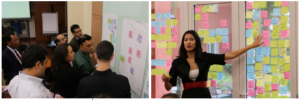

The trouble is these tours are fraught with challenges. What if the understanding officials glean about local programmes during their visit is superficial? What if a visiting government copies and implements a programme that worked in the host country mainly thanks to unique cultural or political circumstances?
The kickoff of the China-Bangladesh Urban Solutions Lab last week is the beginning of a journey at UNDP that could help rethink the study visit – and a big piece of how governments learn from each other.
Our first experiment in this space looked a lot less like the classic, open-ended study trip and more like a facilitated learning process designed to solve key challenges. That process involved three key phases.
Identify challenges and priorities
In the first phase, we worked with the visiting team from Bangladesh, which included three Mayors and two senior municipal and federal government officials, to identify some key challenges and priorities they wanted to address. As a group, this helped us have a clear purpose and directed investigation.
Learn through deep interviews and observation
In the second phase, we heard from and visited a variety of social sector services related to our central challenge – learning how to create better one-stop service centres for users of municipal services. This phase was focused not so much on one-way presentations but on doing deep interviews with the service owners.
Deconstruct and identify transferrable concepts
In the third phase, we worked with the Bangladesh team to deconstruct some of the services and identify concepts that might be transferrable to the Bangladesh context. By the end of the week, these concepts were funneled into an initial scope for creating a one-stop service centre in Bangladesh. It’s an approach that moved us to quickly move from learning to action without sacrificing ignoring China’s specific context.
This is only the beginning. We’ve also taken away a great number of lessons about how to strengthen the learning process between governments and, particularly, south-to-south collaborations.
I’m especially excited for the second half of the project, where we’ll be putting these learnings to action in Bangladesh by designing and prototyping a one-stop centre there to learn about how the potential of deploying them on a larger scale.
Photo credit: UNDP

